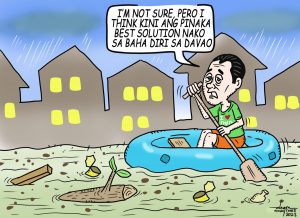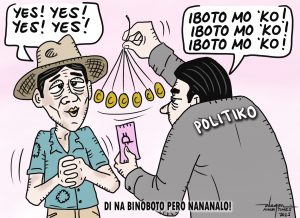BY MARJORIE DUNGOG & HONESTY ALON
SELF-FULFILLMENT is often regarded as a crucial component, or perhaps the entirety, of a decent, contented human existence. It entails realizing one’s greatest aspirations or most deserving potential, which betokens a well-lived life in a society where everyone pursues their meaning differently. Indispensable to this, is man’s freedom to express.
In the Philippines, freedom of expression holds a special place as it was the powerful tool used by the country’s national hero, Dr. Jose Rizal, to advocate for reforms during the Spanish colonial period. His writings exposed the wrongdoings of the colonizers, enlightening Filipinos, and eventually paved the way to Philippine independence. Thus, like in the Philippines, freedom of expression is the foundation of democracy, without which, all other rights are meaningless and unprotected.
Today, although freedom of expression enjoys primacy in the 1987 Constitution, specifically under Article 3, Section 4, which states that “No law shall be passed abridging the freedom of speech, of expression, or of the press, or the right of the people peaceably to assemble and petition the government for redress of grievances.”
The Philippines still endures the ongoing struggle between the populace and the government concerning the preservation of the liberty to speak and that of the press. In most cases, conflict emerges when it is asserted that, while such a right is sacrosanct, it is, however, not absolute.
With the advent of social media, these fundamental rights became more flexible, reaching a wider audience and eliminating geographical constraints. Nonetheless, this flexibility comes with benefits and challenges.
Lately, we are confronted again with the issue of this freedom’s limitation. Earlier this year, the House of Representatives’ three committees (Public Order and Safety, Public Information, and Information and Communications Technology) summoned at least 40 social media personalities to a hearing to investigate the spread of disinformation and fake news across various digital platforms under the Cybercrime Prevention Act.
The said social media personalities, otherwise known as vloggers, were called upon after giving commentaries concerning the current administration, with some of them lost access to their social media accounts. It now poses a critical question: to what extent Filipinos can exercise their right to speak, express, and publish their views as they please, without restraint?
To provide equilibrium in a complex society, the State, through its police power, regulates these rights. Such liberties cannot remain unfettered and unrestrained at all times and under all circumstances.
While the freedom to think is absolute, the power to express such thought in words and deeds has limitations (ABS-CBN Broadcasting Corporation v. Commission on Elections, G.R. No. 133486).
In our jurisdiction, the Supreme Court adheres to the “clear and present danger” doctrine where it echoed the words of Justice Holmes: “The question in every case is whether the words used are used in such circumstances and are of such a nature as to create a clear and present danger that they will bring about the substantive evils that Congress has a right to prevent.” In precis, the question is of the proximity and degree.
Furthermore, in keeping with the situations cited above, since the subject matter is of public interest, the doctrine of fair comment can be invoked as a valid defense, provided that the opinion was reasonably inferred from facts. Defamatory statements made against a public official concerning the discharge of his official duties are not punishable unless made with actual malice.
Mere error or even falsity alone does not prove actual malice because these are equally inevitable in exercising true freedom of expression. After all, what is democracy without open dialogue and criticism? It would be foolish if the citizenry were suppressed from having their share in public life. As Borjal et al. v. Court of Appeals put it, a public official must not be too onion-skinned with reference to comments upon his official acts.
Freedom of expression is a primordial preferred right, essential to attaining self-fulfillment and pursuing truth. Silent rebellion has long been so old-fashioned. Chiefly, it is vital to recognize the bigger picture beneath the surface of this issue.
Trust and transparency are the foundations of effective governance, and any deviation from these values causes the public to demand greater quality of state administration. If free speech is defeated to protect the power of the government, what kind of democracy does the Philippines still have? What awaits when people are silenced because they are deemed to oppose? Isn’t it critical for citizens to be especially diligent and most vigilant in defending and campaigning for their rights during periods of political inconsistency? Because, again, the Philippines is a democratic country where the government is the one accountable to the sovereign Filipino people.
Ultimately, it should be reiterated that every voice matters, even from the humblest man. Everyone has the right to speak and express oneself so long as it does not instigate violence or transgress the rights of others in the same way that they may disagree with those in power and express these opinions in peaceful protests.
Beyond that, while there are limitations, the benefits of free expression far exceed the challenges, as it upholds the very fabric of human rights, which we all deserve.
__________________________________
Marjorie Dungog & Honesty Alon are political science students of the University of Cebu-Main. The piece is part of their requirements in Intro to Journalism subject.


